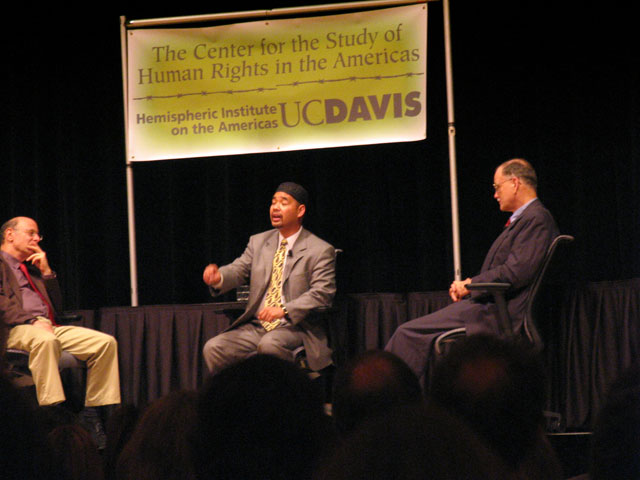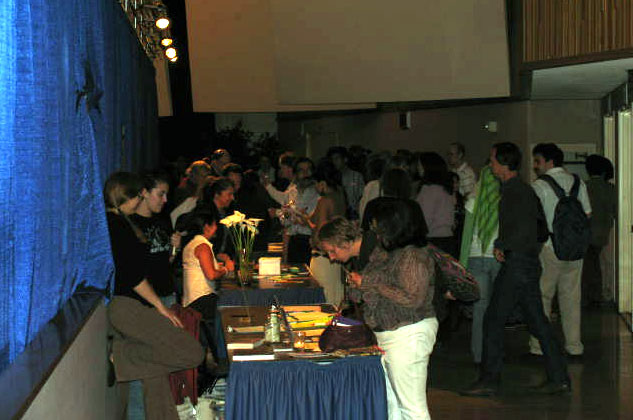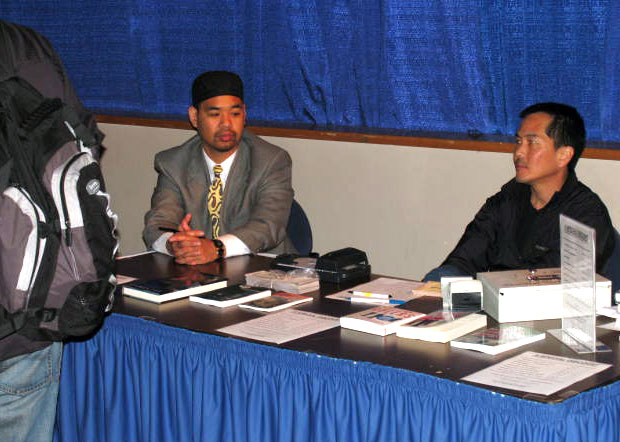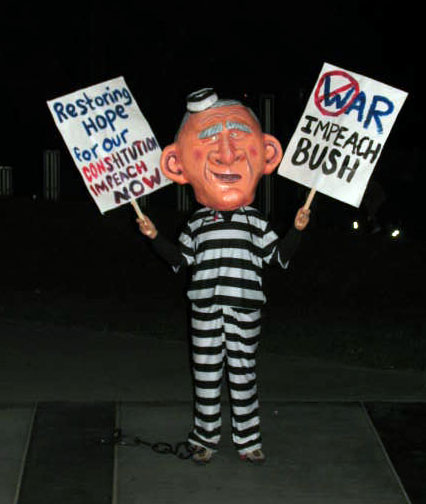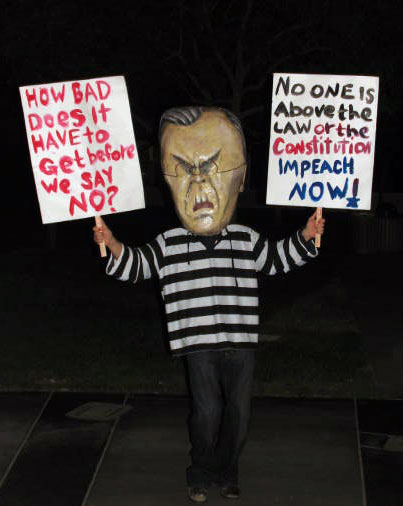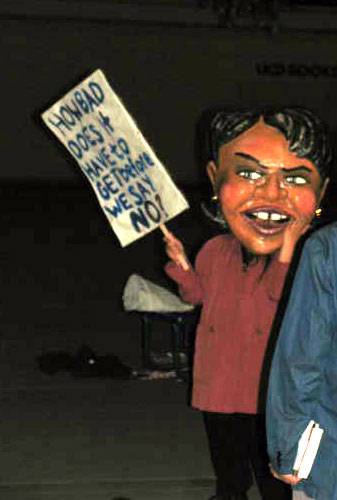From the Open-Publishing Calendar
From the Open-Publishing Newswire
Indybay Feature
Images from A Conversation About Guantanamo - UC Davis
Amy Goodman from Democracy Now!, Michael Ratner of Center for Constitutional Rights; James Yee, former U.S. Army Muslim chaplain at Guantánamo; Alfred McCoy, J.R.W. Smail Professor of History at University of Wisconsin-Madison; at the discussion held in Freeborn Hall, on UCDavis campus May 5, 2006.
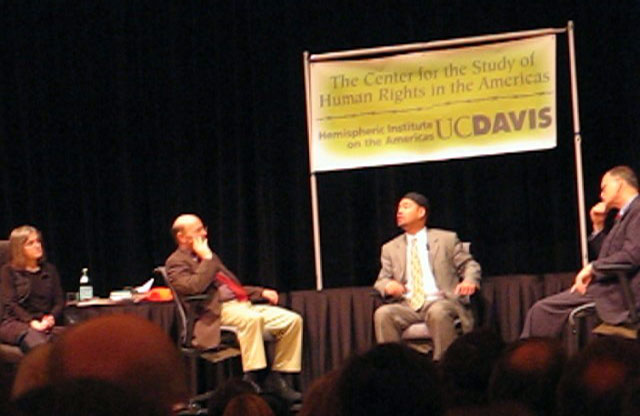
This past Friday night at UC Davis (May 5, 2006), The Center for the Study of Human Rights in the Americas hosted a discussion on Guantánamo. Hundreds attended the event and the panelist received a standing ovation upon taking the stage. Informational materials were provided to the audience upon entry, in addition to free copies of Michael Ratner and Ellen Ray's book titled "Guantánamo - What the World Should Know." Each guest spoke about their area of expertise with moderation by Amy Goodman and then the conversation was opened up to a short question and answer session. Following the event, each speaker signed books and or spoke to individuals from the public in short sessions. Bush, Rumsefeld and Ms. Rice were on hand to inform the audience as they left the event.
Habeas corpus, the Great Writ, dates from 1305 and the reign of King Edward I in England. It allows detainees to ask a court to order their warden to explain the basis for their detention.
Habeas Corpus Act, 1679
Responding to abusive detention of persons without legal authority, public pressure on the English Parliament caused them to adopt this act, which established a critical right that was later written into the Constitution for the United States.
An act for the better securing the liberty of the subject, and for prevention of imprisonments beyond the seas.
WHEREAS great delays have been used by sheriffs, gaolers and other officers, to whose custody, any of the King's subjects have been committed for criminal or supposed criminal matters, in making returns of writs of habeas corpus to them directed, by standing out an alias and pluries habeas corpus, and sometimes more, and by other shifts to avoid their yielding obedience to such writs, contrary to their duty and the known laws of the land, whereby many of the King's subjects have been and hereafter may be long detained in prison, in such cases where by law they are bailable, to their great charges and vexation. http://www.fordham.edu/halsall/mod/1679habeascorp.html
-----------Backgroung on Michael Ratner-------
Michael Ratner is one of the principal counsel representing the Guantánamo prisoners in the Supreme Court. He is President of the Center for Constitutional Rights in New York City. He was a principal attorney in the successful effort to close the U.S. HIV camp for Haitians at Guantánamo in 1993. He lectures regularly on international human rights law in America’s leading law schools, including Yale and Columbia. To learn more about Mr. Ratner go to http://www.humanrightsnow.org/ or http://www.ccr-ny.org/
-----------Background on James Yee-------------
The military leaked information about the case to the press and the media went on a feeding frenzy. Chaplain Yee was vilified on the airwaves as a traitor to his country and accused of being a mole inside of the Army. Then the military's case began to unravel. The charges were eventually reduced and eight months later, dropped altogether. Chaplain Yee has written a book about his experiences called "For God and Country: Faith and Patriotism Under Fire."
James Yee was born in New Jersey and graduated from West Point military academy in 1990. Shortly afterward, he converted from Christianity to Islam in the 1990s and underwent religious training in Syria. After the September 11th attacks, Yee became a frequent government spokesman, helping to educate soldiers about Islam and build greater religious tolerance in the military. In November of 2002, he was selected to serve as Muslim Chaplain at Guantanamo Bay where at that time, nearly 700 detainees were being held by the government for suspected terrorist activities. Yee's duties as chaplain gave him unrestricted access to the detainees and suspicion of him grew amongst his non-Muslim colleagues.
In September 2003, Yee was secretly arrested on his way to meet his wife and daughter for a two week leave. He was accused of spying and of being an operative in a ring that aimed to pass secrets to al-Qaeda from suspected terrorists held at Guantanamo Bay. Yee was locked away in a navy prison and spent 76 days in solitary confinement. The military leaked information about the case to the press and the media went on a feeding frenzy. Chaplain Yee was vilified on the airwaves and on the Internet as a traitor to his country and accused of being a mole inside of the Army. Then the military's case began to unravel. First the charges against Yee were reduced and eventually they were dropped altogether. All criminal charges against Army Capt. James Yee were dropped by the U.S. government March 19, 2004. http://www.democracynow.org/article.pl?sid=05/10/06/1316240
----------------------Background on Alfred McCoy--------------------------
Alfred McCoy, who in the Vietnam era wrote The Politics of Heroin, a now-classic exposé of Central Intelligence Agency tactics in Southeast Asia, and has been on the Agency's case every since, offers the necessary -- and shocking -- historical context. He fills us in on a truly shameful story most of us remember, if at all, only in bits and pieces (those Agency experiments with LSD, for instance): A taxpayer-funded CIA, using up to a billion dollars a year for its research, plunged into a universe of torture way back in the 1950s and emerged with a new set of "no-touch" torture techniques which were then codified in manuals, used in Vietnam, and for over two decades taught to allied police forces and militaries around the Third World. It turns out that many of these techniques, some over half-a-century old, have just been paraded before our eyes in the Abu Ghraib snapshots. In other words, the now infamous photos were evidence, for those who could interpret them, of CIA-influence in Abu Ghraib (as the recent report by Major General George R. Fay has confirmed). http://www.tomdispatch.com/index.mhtml?pid=1795
Habeas corpus, the Great Writ, dates from 1305 and the reign of King Edward I in England. It allows detainees to ask a court to order their warden to explain the basis for their detention.
Habeas Corpus Act, 1679
Responding to abusive detention of persons without legal authority, public pressure on the English Parliament caused them to adopt this act, which established a critical right that was later written into the Constitution for the United States.
An act for the better securing the liberty of the subject, and for prevention of imprisonments beyond the seas.
WHEREAS great delays have been used by sheriffs, gaolers and other officers, to whose custody, any of the King's subjects have been committed for criminal or supposed criminal matters, in making returns of writs of habeas corpus to them directed, by standing out an alias and pluries habeas corpus, and sometimes more, and by other shifts to avoid their yielding obedience to such writs, contrary to their duty and the known laws of the land, whereby many of the King's subjects have been and hereafter may be long detained in prison, in such cases where by law they are bailable, to their great charges and vexation. http://www.fordham.edu/halsall/mod/1679habeascorp.html
-----------Backgroung on Michael Ratner-------
Michael Ratner is one of the principal counsel representing the Guantánamo prisoners in the Supreme Court. He is President of the Center for Constitutional Rights in New York City. He was a principal attorney in the successful effort to close the U.S. HIV camp for Haitians at Guantánamo in 1993. He lectures regularly on international human rights law in America’s leading law schools, including Yale and Columbia. To learn more about Mr. Ratner go to http://www.humanrightsnow.org/ or http://www.ccr-ny.org/
-----------Background on James Yee-------------
The military leaked information about the case to the press and the media went on a feeding frenzy. Chaplain Yee was vilified on the airwaves as a traitor to his country and accused of being a mole inside of the Army. Then the military's case began to unravel. The charges were eventually reduced and eight months later, dropped altogether. Chaplain Yee has written a book about his experiences called "For God and Country: Faith and Patriotism Under Fire."
James Yee was born in New Jersey and graduated from West Point military academy in 1990. Shortly afterward, he converted from Christianity to Islam in the 1990s and underwent religious training in Syria. After the September 11th attacks, Yee became a frequent government spokesman, helping to educate soldiers about Islam and build greater religious tolerance in the military. In November of 2002, he was selected to serve as Muslim Chaplain at Guantanamo Bay where at that time, nearly 700 detainees were being held by the government for suspected terrorist activities. Yee's duties as chaplain gave him unrestricted access to the detainees and suspicion of him grew amongst his non-Muslim colleagues.
In September 2003, Yee was secretly arrested on his way to meet his wife and daughter for a two week leave. He was accused of spying and of being an operative in a ring that aimed to pass secrets to al-Qaeda from suspected terrorists held at Guantanamo Bay. Yee was locked away in a navy prison and spent 76 days in solitary confinement. The military leaked information about the case to the press and the media went on a feeding frenzy. Chaplain Yee was vilified on the airwaves and on the Internet as a traitor to his country and accused of being a mole inside of the Army. Then the military's case began to unravel. First the charges against Yee were reduced and eventually they were dropped altogether. All criminal charges against Army Capt. James Yee were dropped by the U.S. government March 19, 2004. http://www.democracynow.org/article.pl?sid=05/10/06/1316240
----------------------Background on Alfred McCoy--------------------------
Alfred McCoy, who in the Vietnam era wrote The Politics of Heroin, a now-classic exposé of Central Intelligence Agency tactics in Southeast Asia, and has been on the Agency's case every since, offers the necessary -- and shocking -- historical context. He fills us in on a truly shameful story most of us remember, if at all, only in bits and pieces (those Agency experiments with LSD, for instance): A taxpayer-funded CIA, using up to a billion dollars a year for its research, plunged into a universe of torture way back in the 1950s and emerged with a new set of "no-touch" torture techniques which were then codified in manuals, used in Vietnam, and for over two decades taught to allied police forces and militaries around the Third World. It turns out that many of these techniques, some over half-a-century old, have just been paraded before our eyes in the Abu Ghraib snapshots. In other words, the now infamous photos were evidence, for those who could interpret them, of CIA-influence in Abu Ghraib (as the recent report by Major General George R. Fay has confirmed). http://www.tomdispatch.com/index.mhtml?pid=1795
For more information:
http://www.humanrightsnow.org/
Add Your Comments
We are 100% volunteer and depend on your participation to sustain our efforts!
Get Involved
If you'd like to help with maintaining or developing the website, contact us.
Publish
Publish your stories and upcoming events on Indybay.
Topics
More
Search Indybay's Archives
Advanced Search
►
▼
IMC Network


